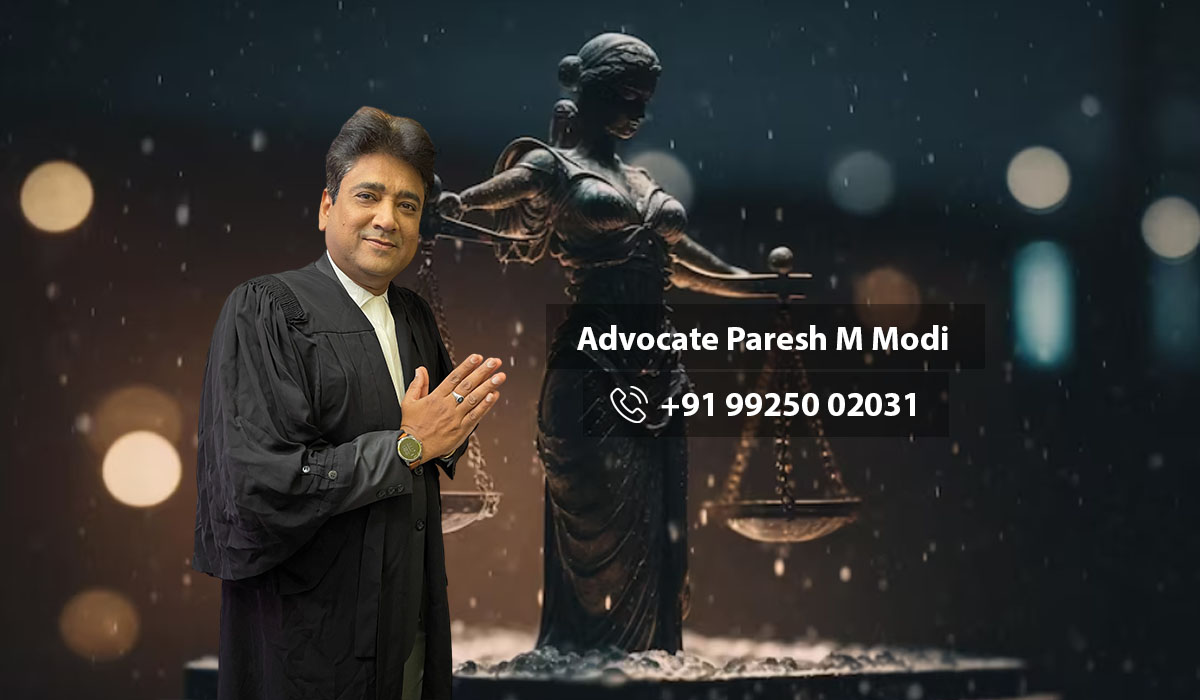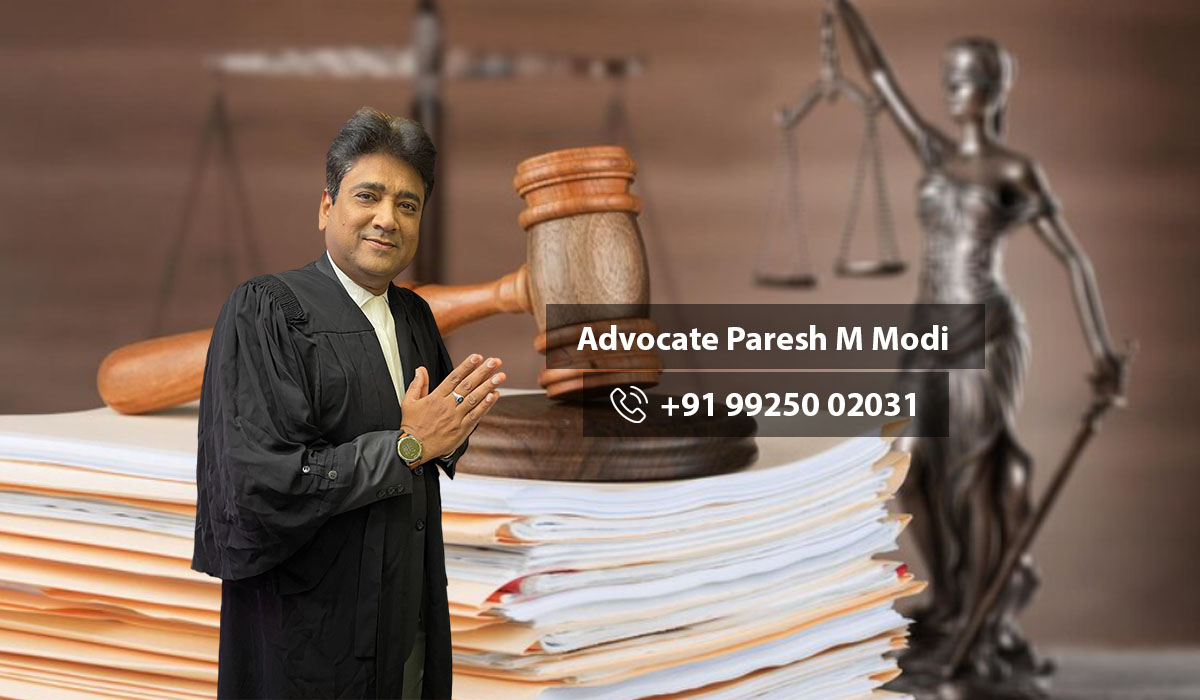High Court Advocate | Paresh M Modi | Anticipatory Bail | Regular Bail | FIR Quashing | Criminal Lawyers | Cheque Return Appeal | Ahmedabad | Gujarat | Mumbai | Delhi | Pune | Gandhinagar
Advocate Paresh M Modi, based in Ahmedabad, Gujarat, is a renowned legal expert with extensive experience in criminal law, specializing in handling complex cases across multiple judicial forums, including District Courts, Sessions Courts, High Court of Gujarat, High Court of Bombay, High Court of Delhi, His dedication, thorough understanding of legal nuances, and strong litigation skills make him a trusted name in the legal fraternity. he is one of the Best Criminal lawyers in Gujarat High Court Bombay High Court Delhi High Court. he is renowned for his expertise in high-profile and complex criminal cases across multiple legal domains. As a practicing Advocate in the High Courts of Gujarat Bombay Delhi, he provides strategic representation for Bail, Anticipatory Bail, Regular Bail, and FIR Quashing cases.
In Gujarat, He is operating extensively across Ahmedabad, Vadodara, Rajkot, Surat, Mahesana, Banaskantha District, Sabarkantha District, Kutch District and Gandhinagar districts, he brings a depth of experience and knowledge to each case.
Advocate Modi’s practice covers critical legal frameworks, including, The Foreign Exchange Management Act (FEMA), Central Bureau of Investigation (CBI) cases, Enforcement Directorate (ED) cases, Economic Offences Wing (EOW) cases, and the Prevention of Money Laundering Act (PMLA). His expertise also encompasses cases under the Securities and Exchange Board of India (SEBI) Act, Protection of Children from Sexual Offences (POCSO) Act, Directorate of Revenue Intelligence (DRI) Department, The Gujarat Prohibition (GP) Act, Prevention of Corruption Act (PCA), Juvenile Justice (Care and Protection of Children) Act, Narcotic Drugs and Psychotropic Substances (NDPS) Act, Drugs & Cosmetic Act 1940 and the Anti-Corruption Bureau (ACB) Act. His thorough understanding of these laws and unmatched courtroom advocacy make him a sought-after advocate for clients requiring specialized legal knowledge. Advocate Modi’s dedication to justice and his adept handling of sensitive and complex matters place him among the most reliable and Trusted legal professionals in Gujarat Mumbai Delhi, providing clients with strong, dependable legal representation.
Advocate Paresh M Modi, based in Ahmedabad, Gujarat, is a renowned legal expert with extensive experience in criminal law, specializing in handling complex cases across multiple judicial forums, including District Courts, Sessions Courts, High Court of Gujarat, High Court of Bombay, High Court of Delhi. His dedication, thorough understanding of legal nuances, and strong litigation skills make him a trusted name in the legal fraternity.
Gujarat
Gujarat is a thriving state known for its industrial development, cultural heritage, and economic significance. From the vibrant streets of Ahmedabad to the serene landscapes of Gir Forest, Gujarat offers a blend of tradition and modernity. Key industries include textiles, petrochemicals, and tourism.
Mumbai – Bombay
Mumbai, formerly known as Bombay, is India’s financial capital and the heart of the Bollywood film industry. Known for its iconic landmarks like the Gateway of India and Marine Drive, Mumbai is a bustling metropolis blending history, culture, and innovation.
Pune
Pune is a vibrant city celebrated for its educational institutions, IT hubs, and cultural significance. Often referred to as the “Oxford of the East,” Pune offers a perfect mix of traditional Maharashtrian culture and modern lifestyle.
Delhi – New Delhi
Delhi, India’s capital city, combines historical grandeur with contemporary living. Home to iconic monuments like the Red Fort and India Gate, Delhi is a hub for politics, culture, and diverse cuisines.
Gandhinagar
Gandhinagar, the capital of Gujarat, is a planned city renowned for its greenery and structured layout. It houses significant landmarks like Akshardham Temple and serves as an administrative and cultural center.
Lawyers in India
Lawyers are legal professionals who provide advice, guidance, and representation in legal matters. They may specialize in various areas of law, such as corporate law, family law, criminal law, or civil law. In general, lawyers help clients understand their legal rights, draft documents, and represent them in courts or other legal forums.
Advocates in India
Advocates are a specific type of lawyer who is authorized to appear in court on behalf of clients. In India, the term “advocate” refers to a licensed professional who is enrolled with a state bar council and has the right to practice before courts. All advocates are lawyers, but not all lawyers are advocates, as some may only offer legal advice or work in legal research.
High Court Advocates in India
High Court Advocates are specialized advocates who represent clients in the High Court, the highest judicial authority in each state or union territory. These advocates handle complex legal issues, including constitutional matters, civil and criminal appeals, writ petitions, and public interest litigations. Their practice often involves intricate legal arguments and precedents.
Criminal Lawyers in India
Criminal Lawyers focus on defending individuals or entities accused of committing crimes. They represent clients in cases ranging from minor offenses like theft to major crimes such as murder or corruption. Criminal lawyers provide defense strategies, negotiate plea deals, and represent clients in trials to ensure a fair legal process.
FIR Quashing Lawyers in India
FIR Quashing Lawyers specialize in seeking the dismissal or quashing of First Information Reports (FIRs) filed against clients. If a person believes an FIR is false, baseless, or lacks merit, these lawyers file petitions in higher courts (such as the High Court) to have the FIR quashed, which can help prevent unwarranted investigations or trials.
Bail Case Lawyers in India
Bail Case Lawyers assist clients in obtaining bail—temporary release from custody while awaiting trial or investigation. They prepare bail applications, argue for their clients’ release, and ensure that all legal requirements are met. Bail lawyers are critical in criminal cases, where they work to ensure their clients’ rights are protected during pre-trial detention.
Lawyers
Legal professionals authorized to advise, represent, and advocate for clients in legal matters in courts or other legal forums.
Advocates
Specialized lawyers who represent clients in court, presenting arguments and ensuring justice under the legal framework.
Case
A legal dispute or issue brought before a court, involving parties seeking a resolution through judicial intervention.
Act
A statute or formal written law passed by a legislative body, governing specific legal areas or practices.
Additional Chief Judicial Magistrate Court
A subordinate court in India that handles specific criminal cases as assigned by jurisdictional authority.
Trial Court
The first level of the judiciary where cases are initially filed, evidence is examined, and judgments are rendered.
District Court
A court at the district level that handles civil and criminal cases, serving as an appellate court for subordinate courts.
Sessions Court
A higher court for criminal trials, dealing with serious offenses like murder, theft, and financial fraud under Indian law.
High Court
A state-level court with appellate jurisdiction over civil and criminal cases and powers to interpret constitutional matters.
Cheque
A negotiable instrument directing a bank to pay a specific sum from the account holder’s funds to the bearer or payee.
Law
A system of rules enforced by institutions to regulate conduct, resolve disputes, and maintain order in society.
Criminal Lawyer
An attorney specializing in defending individuals or entities accused of criminal activities in courts of law.
Matrimonial
Legal matters related to marriage, divorce, maintenance, and other familial relationships governed by personal laws.
Marriage
A legally recognized union between two individuals, governed by specific legal frameworks like the Hindu Marriage Act.
Divorce Law
The legal process of dissolving a marriage, addressing issues like alimony, child custody, and property division.
Property
Tangible or intangible assets owned by individuals or entities, subject to transfer, sale, or inheritance laws.
Ancestral Property
Inherited property passed down through generations, governed by succession laws in India, like the Hindu Succession Act.
Disputes
Legal conflicts or disagreements between parties, resolved through mediation, arbitration, or court proceedings.
Matters
Legal issues or subjects requiring attention or resolution under judicial or administrative frameworks.
Warrant
A legal document issued by a court authorizing law enforcement to perform specific actions, like arrest or search.
Summons
A legal notice issued by a court, compelling an individual to appear in court or provide evidence.
Bail
A temporary release of an accused person awaiting trial, granted on conditions set by the court.
Jamanat
The Hindi term for bail, referring to the provisional release of an accused individual upon furnishing security.
FIR
First Information Report, a written complaint filed with the police to initiate an investigation of a crime.
Police Station
A local law enforcement office where complaints are filed, FIRs are registered, and investigations are initiated.
Court Case
A legal proceeding where parties present evidence and arguments to resolve disputes or seek justice under law.
Ahmedabad
A major city in Gujarat, India, known for its vibrant legal services and home to prominent lawyers and advocates.
Gujarat
A western state in India, governed by state and central laws, with a robust judiciary system for justice delivery.
Law Firm
An organization of lawyers providing legal services, advice, and representation to individuals and businesses.
Legal Services
Professional assistance in resolving disputes, drafting agreements, and representing clients in legal matters.
Legal Advice
Guidance provided by qualified lawyers to help individuals understand their rights, obligations, and legal options.
Gujarat High Court Advocate | Paresh M Modi | 9925002031 | Bail Lawyer in Gujarat
Gujarat High Court at Ahmedabad
The High Court of Gujarat, located in Ahmedabad, serves as the apex judicial body for the state of Gujarat. Established on May 1, 1960, following the bifurcation of the Bombay State, the court operates under the Constitution of India to administer justice in civil, criminal, and constitutional matters. Renowned for its historical significance and modern judicial infrastructure, the court ensures efficient case management and a progressive approach to legal proceedings. The High Court of Gujarat has original and appellate jurisdiction and also acts as a guardian of fundamental rights. Its jurisdiction extends to all districts and tribunals across Gujarat.
Bombay High Court Advocate | Paresh M Modi | 9925002031 | Criminal Advocate in Mumbai | Bail Lawyer in Mumbai
High Court of Bombay at Mumbai
The High Court of Bombay, one of the oldest High Courts in India, was established on August 14, 1862. Situated in Mumbai, it serves as the principal judicial authority for the state of Maharashtra and the union territories of Dadra and Nagar Haveli and Daman and Diu. Known for its architectural grandeur, the court is also a symbol of justice and resilience. With both original and appellate jurisdiction, the High Court of Bombay handles complex legal issues, from civil disputes to criminal cases and constitutional matters. The court is renowned for its pioneering judgments and has significantly influenced Indian jurisprudence.
Delhi High Court Lawyer | Paresh M Modi | 9925002031 | Criminal Advocate in Delhi | Bail Lawyer in Delhi
High Court of Delhi at New Delhi
The High Court of Delhi, established on October 31, 1966, is one of the leading judicial forums in India. Located in the heart of the national capital, the court has jurisdiction over Delhi and handles an extensive range of cases, including constitutional matters, public interest litigations, and commercial disputes. The Delhi High Court is known for its efficiency and landmark judgments, particularly in areas of intellectual property law, arbitration, and administrative law. Its proactive stance on societal issues has earned it a reputation for delivering impactful decisions.
Top Criminal Lawyer for Special Acts | Paresh M Modi | 9925002031 | Gujarat | Mumbai | Delhi | Bail Lawyers
Advocate Paresh M Modi, based in Ahmedabad, Gujarat, is a seasoned lawyer practicing in the High Court of Gujarat, High Court of Bombay, and High Court of Delhi. With extensive expertise in criminal, civil, and constitutional matters, he is renowned for his strategic approach and in-depth understanding of legal intricacies. Advocate Modi has successfully represented clients in complex cases, including appeals, revisions, writ petitions, and PILs.
His professional ethos revolves around delivering justice and safeguarding clients’ rights. Advocate Paresh M Modi’s practice extends to matters of financial fraud, land disputes, corporate law, and personal rights. Known for his meticulous preparation and persuasive arguments, he is a trusted name among clients seeking legal solutions at the highest judicial forums in Gujarat, Maharashtra, and Delhi
List of Special Acts and its investigation Agencies:
· FEMA (Foreign Exchange Management Act, 1999): Directorate of Enforcement (ED)
· ED (Enforcement Directorate): Directorate of Enforcement (ED)
· CBI (Central Bureau of Investigation): Central Bureau of Investigation (CBI)
· EOW (Economic Offences Wing): State Police Economic Offences Wing
· POCSO (Protection of Children from Sexual Offences Act, 2012): State Police
· PMLA (Prevention of Money Laundering Act, 2002): Directorate of Enforcement (ED)
· SEBI (Securities and Exchange Board of India): SEBI
· NDPS (Narcotic Drugs and Psychotropic Substances Act, 1985): Narcotics Control Bureau (NCB)
· DRI (Directorate of Revenue Intelligence): Directorate of Revenue Intelligence (DRI)
Additional Special Acts and Investigating Agencies:
· IPC (Indian Penal Code): State Police
· CrPC (Code of Criminal Procedure): State Police
· IT Act (Information Technology Act, 2000): Cyber Crime Cell of State Police
· NIA (National Investigation Agency): National Investigation Agency (NIA)
Practice Areas
1. Lawyer for Anticipatory Bail Applications
Advocate Paresh M. Modi has a proven track record of successfully representing clients in anticipatory bail applications under Section 438 of the Criminal Procedure Code (CrPC). He ensures his clients’ rights are safeguarded by presenting a compelling case that highlights the absence of prima facie evidence, mitigating circumstances, and legal precedents.
2. Lawyer for Regular Bail Applications
Specializing in regular bail under Section 439 of CrPC, he advocates for clients’ release by focusing on procedural fairness, factual analysis, and ensuring adherence to legal principles. His expertise extends to cases involving white-collar crimes, cyber fraud, financial disputes, and general offenses under the Indian Penal Code (IPC).
3. Advocates for Discharge Applications
Advocate Modi is adept at filing discharge applications under Section 227 of CrPC, aiming to release his clients from baseless allegations or charges during the pre-trial stage. His meticulous approach often results in successful outcomes in Sessions Courts.
4. Advocates for FIR Quashing Cases
At the High Court of Gujarat, High Court of Bombay, High Court of Delhi, Advocate Modi handles FIR quashing petitions under Section 482 of CrPC, focusing on preventing misuse of the law and ensuring justice. He specializes in cases involving false accusations, abuse of process, and malicious prosecution.
Specialist in Cheque Return Cases – NI Act Section 138 Cases
Advocate Paresh M Modi is a leading name in handling cheque return cases under Section 138 of the Negotiable Instruments Act (NI Act). These cases involve dishonored cheques due to insufficient funds or other reasons. His approach includes:
- Filing and Defending Complaints: He represents both complainants and accused parties in cheque bounce cases at Trial Courts, ensuring the law’s procedural and substantive aspects are addressed.
- Criminal Appeals and Revisions: Modi handles appeals and revision applications in Sessions Courts and the High Court, challenging or defending judgments passed by lower courts.
- Focus on Resolution: He emphasizes swift and amicable resolution through legal means, whether by securing penalties for the complainant or negotiating settlements.
Contact Information
For legal consultation or representation in matters of Anticipatory bail, Regular bail, Discharge Applications, FIR Quashing, Cheque Return Cases, Criminal Appeals, connect with Advocate Paresh M Modi through his official website: www.advocatepmmodi.in. you may contact him on Land line Phone no. 079-48001468 (During the 10.45 am to 6.30 pm, On working days only) and WhatsApp message on Mobile No. 9925002031 (During 9 am to 9 pm)




